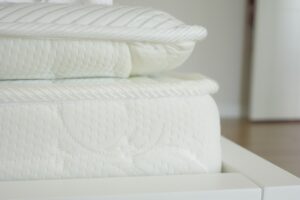From a young age, you’re taught to go to sleep early and get a good night’s sleep. You probably a set bedtime and your parents nagging you that got you to go to go to sleep at a reasonable hour. Now that you’re a bit older, you probably don’t have the same strict bedtime or your parents to tell you when to hit the sheets. You’ve probably even got a job to keep you busy. With that, if you find yourself dozing off during work, chances are (~surprise~) you’re not getting enough sleep! So how does sleep affect your work? And what can you do about it?
There are scientific proof that shows that when we lack sleep, our brains don’t function as well as they would if you did get enough sleep. Needless to say, most of us know this already but we often neglect sleep and overlook how necessary sleep can be when you deal with work that may demand energy such as decision-making, communicating, and more.

Recently, Dutch researchers of the Netherlands Study of Depression and Anxiety took a sample of 1,435 people and observed the links between work performance, sleep, and anxiety/depressive disorders. Additional considerations that researchers looked for in the sample were medical and mental histories, sociodemographics, and work habits. After carefully observing these factors, the researchers inquired about work absences, self-assessed work performance, sleep duration, and sleep issues. From this sample, about half of the participants had been diagnosed with some form of anxiety or depressive disorders.
How Sleep Effects Your Work
What researchers could conclude from this research was that sleep problems were correlated to work performance particularly for people with depression and anxiety disorders. Some notables from this study were:
- Participants with either anxiety or depressive disorders were 2.2 times more likely to have an impaired work performance
- Participants with insomnia were 56% more likely to also have impaired work performance
- Participants that had either anxiety or depressive disorders plus insomnia were 2.48 times more likely to have a long-term work absence
- Participants without disorder but long sleep durations were 4.28 times more likely to have impaired work performance and only 37% more likely to miss work long-term
- Participants with anxiety/depressive disorders and a short sleep duration were 2.54 times more likely to have impaired work performance and 85% more likely to miss work long-term
- Participants with anxiety/depressive disorder and a long sleep duration were 20% less likely to have impaired work performance and 17% less likely to miss work long term
The study indicated that participants with depressive disorders who slept less than 6 hours or had insomnia were more at risk of their rest affecting their work. Additionally, those without disorders but had either more than 10 hours of sleep per night or insomnia were also at risk of the same. Of these people, they are more likely to decline in their work performance and take absences of two weeks or longer from their jobs.
An additional study from the Brigham and Women’s Hospital conducted research back in 2012 on work performance and it’s correlation to deteriorating effects on those who were sleep-deprived. In this research, participants were allowed to sleep less than 6 hours every day for the duration of one month. As you might have guessed, the participants’ performances began to decline with every passing week.
Notably, some of history’s biggest disasters like the Three-Mile Island and Chernobyl nuclear accidents, Challenger explosion, and the Exxon Valdez oil spill have been caused by sleep-deprived workers. Sleep-deprivation and drowsiness have been also linked to being as dangerous as drunk driving.
The Effects of Sleep Deprivation
Moreover, Harvard professor Dr. Charles A. Czeisler, a renowned sleep researcher, found that when hospital interns were scheduled to work for 24 hours, there were alarming observations made. Some of these observations included an increase in the likelihood of:
- stabbing themselves with a needle or scalpel by 61%
- the risk of crashing a motor vehicle increased by 168%
- the risk of a near miss increased by 460%
- 1/5th of motor vehicle accidents were caused by drowsy drivers
- Vehicle accidents caused by drowsy drivers cause 8,000 deaths annually
- around 80,000 drivers fall asleep at the wheel every day
In terms of how sleep-deprivation can affect work, well-mannered managers were likely to act in ways they regularly would not act in like lashing out at employees, make decisions that affect the company in the future, or give muddled presentations to other parties. Dr. Czeisler recommends that businesses start prioritizing sleep and educating employees on sleep hygiene in the same way they train employees about policies and harassment. Although sleep may not be the largest of problems in a business, it proves to have promising long term effects.
Progressive businesses have understood the need for happy and well-rested employees are necessary for quality work. These businesses often offer spaces to take power naps on a break or during lunch without having to leave the work premises.
If more businesses traded in their negative view of sleeping as being lazy for a positive new look on how sleep can be beneficial to employees, the quality of work produced by well-rested employees is far better than the sleep-deprived. As mentioned earlier, more businesses have started to adopt napping and creating spaces for napping in their offices. There are many benefits to allowing napping or for an office relaxation room such as:
- one hour naps can increase productivity up to 10 hours afterwards
- 26 minute naps increase alertness by 54% and performance by 34%, as studied by NASA
- 40 minute naps can improve alertness by 100%, as studied by NASA
- naps can improve social and personal interactions
- naps combined with caffeine can improve alertness and performance for night shift workers
- there’s a 37% decrease in risk of heart disease, heart failure, and death among people who nap
- stamina, mental abilities, alertness and elevated mood show improvements from varying lengths of naps
However, naps longer than 20 minutes can induce sleep inertia and grogginess. Another thing to look out for before you nap is to not nap too close to bedtime or too long. The best naps would be during the day around 10-30 minutes and around 6 hours before you bedtime.
Besides the naps, sleeping and getting quality rest is just as important not only for productivity but also for your health. Some ways to get a better sleep can be by lowering or turning off all lights surrounding your sleeping space as well as cancelling noises from this very space. Additionally, make sure that the surrounding sleeping space is the right temperature as well as clean so as to not have difficulty with breathing potential dusts. Lastly, make sure you have the right pillows and mattress to optimize your comfort and sleep!
There’s so much to do everyday, but make sure to have a good night’s rest! Also consider taking naps in order to increase productivity. With all the benefits that napping and getting quality sleep can provide, you should start penciling in a little siesta in your schedule today!
With Tochta’s custom mattresses, you can achieve the best quality of sleep whether you’re on the road or heading into work! Tochta offers you a quality mattress that not only is comfortable but also customized to fit your unique sleeping pattern. Try Tochta’s mattresses for yourself for the sleep you deserve after a long day at work or on the road!




